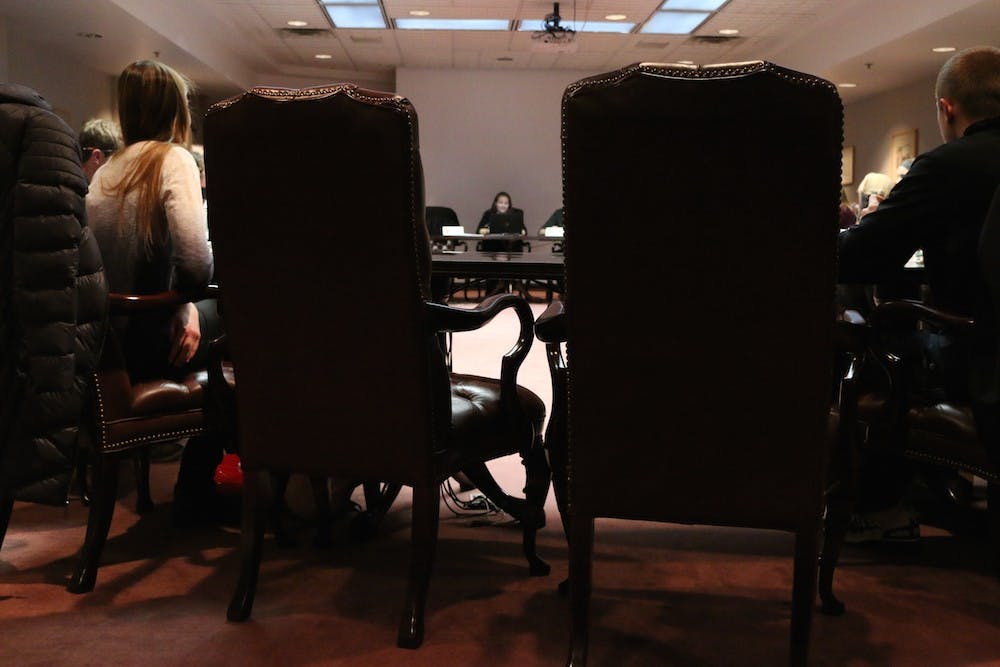During its first meeting of the calendar year, Otterbein University’s Student Government (OUSG) missed the minimum attendance level required to vote on items of business.
At the previous meeting several items of business had been scheduled for a vote, including the alcohol policy developed last semester. Instead the OUSG used their first meeting to review the semester’s agenda and hear presentations from special guests.
According to Vice President Connor Dunn, who filled in as chairperson for President Carrie Coisman who was absent due to an emergency hospital visit and class conflict, "there was going to be a preliminary vote to decide if they they were going to take the [alcohol] policy in front of non-student government eyes." A vote in favor would have passed the policy on to various campus offices for review before being discussed by the general university senate at its next meeting, Feb. 9. The review process was intended to determine the likelihood of the policy being accepted by a vote of the general senate.
With 54 percent of the required 66 percent of senators in attendance, the OUSG was below quorum and unable to take official voting action on the policy.
Advisor Colette Masterson recommended that instead the OUSG hold an unofficial vote to gauge interest, after which the policy could still be sent for review by campus offices. The policy would still need to be accepted by an official vote before it could be discussed as an item of business on the Feb. 9 meeting.
The unofficial vote was unanimously in favor of accepting the policy.
Also on the voting agenda was discussion of including a title IX section in all class syllabi, which was put off due to Coisman’s absence, and the creation of a textbook affordability resolution.
The resolution would take the form of a letter sent to the faculty senate, requesting the formation of a joint committee to address the high cost of textbook and class materials passed on to students in addition to tuition.
The resolution could not be officially formed by a vote, but some possible ideas were discussed, such as requiring that all professors keep one copy of required books on reserve at the library.
Upcoming OUSG elections were also a focus of discussion. In an effort to increase student participation, each senator was given four cards by the head of the OUSG elections committee. Each card was a personal invitation that the senators could give to individuals of their choosing they believed would make effective future senators.
A list of dates and candidacy registration materials for interested students can be found on Ozone under the student life tab. You do not have to receive an invitation to run for a position in senate.
During reports, the budget committee mentioned a 4 percent increase in the cost of meal plans for the 2016-2017 school year; as well as a shift in the calculation of the cost of summer housing to a daily fee rather than a single lump sum and the possibility of implementing a new technology fee.
Student representative of the committee Cara Hardy was absent and could not answer questions.
Representatives from the curriculum committee discussed a possible resolution to make optional or abolish both foreign language and health general education requirements. Numerous majors have received exemptions from these requirements already, and this resolution would give all departments the chance to evaluate whether or not they felt foreign language or health courses should be required for their students to graduate.
First among the special guests invited to the Jan. 14 meeting, Jet’s pizza announced an official partnership with Otterbein University, after a trial period working with the school’s athletic department. The partnership provides discounted prices on various menu items as well as catering options.
Members of the community simply need to call the Westerville city Jets Pizza location and ask for the Otterbein special.
President Kathy Krendl also gave an update on the now under-construction Science Technology Engineering Art and Math (STEAM) center that is being housed in a renovated 60 College view. The center is scheduled to be built in three phases, taking place over the next three years. The first phase, which has already begun, consists of creating classroom and office space for the new systems engineering program. Physics, art, and math faculty and classes may also be moved to the building. Phase one is scheduled to be complete by Fall of 2016, with faculty moving over in June.
Phases two and three, scheduled to be completed in Fall of 2017 and 2018 respectively, will include the construction of rent-able office and research space for use by local business and school districts, as well as a coffee shop. A footbridge between the service building and the STEAM center over Alum creek is also being discussed. The total cost of the project is estimated to be 10.8 million dollars.
President Krendl also highlighted various economic and educational benefits to constructing the STEAM center.
“[The STEAM Center] is a central interest and central opportunity for economic development…” said President Krendl, “…it is based on the principles of collaboration, partnership, integration and community.”
The center is being built partially based on the recommendation of a 2010 study conducted by the central Ohio area economic development board Columbus 2020, which listed centers of innovation and entrepreneurship in tandem with colleges and universities as a major contributor to economic growth.
More information about the STEAM center will be made available during a joint announcement with project funding partners on Feb. 19.








